You can now add Healthify as a preferred source on Google. Click here to see us when you search Google.
Abuse – elder
Known as elder abuse
Key points about elder abuse
- Elder abuse is any behaviour causing harm or distress to an older person by someone they should be able to trust.
- It can be physical, psychological, financial, sexual, institutional or involve neglect.
- It can happen just once, but more often it happens repeatedly over a period of time.
- Some people are at greater risk of abuse due to problems within a family or carers struggling with their role.
- Signs of abuse may include unexplained behaviours and injuries, anxiety and financial issues.
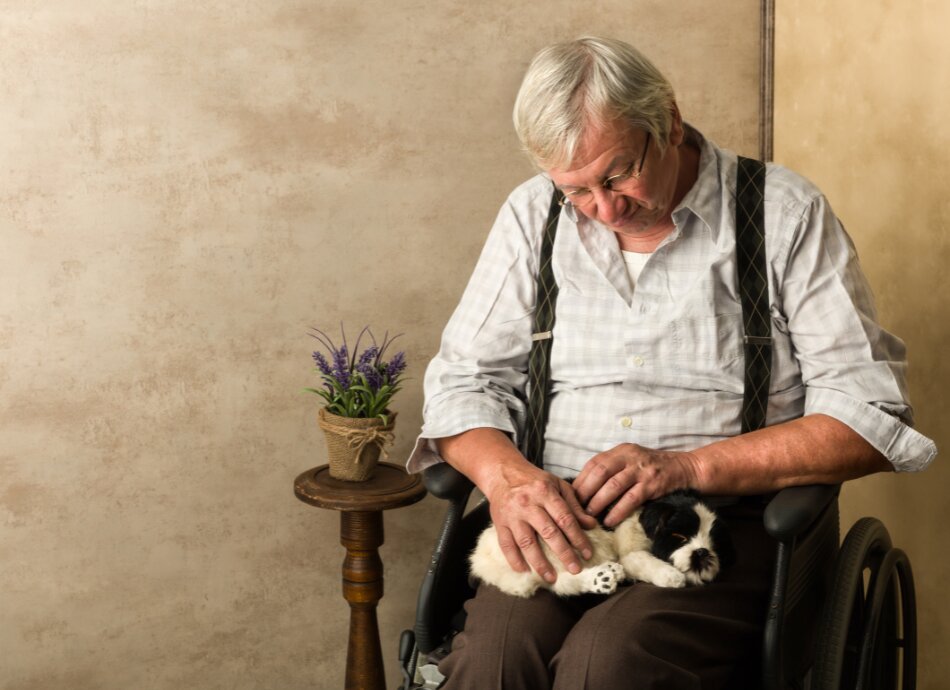
Elder abuse is when an older person is harmed or distressed by the behaviour of somebody they should be able to trust, such as an adult child or grandchild, a partner, a friend or neighbour, or a healthcare or support worker.
It can include disrespect or being manipulated, isolated, hurt or stolen from.
It can be psychological, physical, financial, sexual or institutional. It can also be neglect.
It may happen just once but may happen again and again.
Elder abuse is a worldwide problem. Up to 10% of older adults in Aotearoa New Zealand (1 in 10) will experience some form of elder abuse.
Elder abuse can happen:
- in every religious, cultural, ethnic and income group
- in any setting, rural or urban
- for older people living on their own or living with others
- in private homes or within a residential care or health care setting
- to people who are frail and vulnerable and depend on others to meet their needs.
Sadly, much abuse isn't reported or is only reported after it has got to the point of causing real harm to an older person.
Elder abuse can happen for many reasons.
Caregiver factors
These can include:
- difficult circumstances, such as lack of money, especially if they depend on the older person financially
- mental health or substance abuse problems
- too much responsibility and not enough support
- a difficult relationship with the person being cared for in the past.
The older person’s situation
This may contribute too, for example:
- Needing increasing amounts of care to a level where the carer doesn’t have the understanding or ability to provide it, especially personal care like showering and toileting.
- Communication problems (eg, hearing or vision loss) make care harder or more frustrating.
- An illness or dementia that can cause unpredictable behaviour, wandering, aggression, or major changes in personality.
Alcohol or other substance abuse. - Having left school at an early age.
- Having few family members or friends in their life.
In residential care or hospitals
Abuse can happen when staff and organisations are under stress or poorly managed. Some examples are listed below.
- When staff members are working alone, or isolated from other parts of the hospital or community.
- When staff members are under pressure, or are poorly supervised or supported, due to:
- lack of training
- heavy workload, or burnout
- high turnover
- poor environment or working conditions.
- If staff have personal problems such as mental health or substance abuse problems.
- If staff (or the organisation) has ways of working that don’t meet the social and cultural needs of residents.
There are 5 common categories of elder abuse, plus neglect.
Physical abuse – acts of violence
This can include:
- physical punishment, hitting, pushing, shaking, slapping, pinching, choking or burning
- force-feeding
- over-medication
- inappropriate use of physical restraints or limiting physical freedom.
Psychological abuse – behaviour causing fear, stress or emotional pain
This can include:
- verbal abuse, threats, belittling
- harassment
- holding back affection
- taking away choices, decision-making power or isolating people.
Financial abuse – inappropriate use of money or property
This can include:
- forging somebody’s signature
- forcing them to sign over money or belongings, or pressuring them to sign a document like a will or house sale and purchase agreement
- use of their home without helping out with costs
- stealing money or things
- misusing a power of attorney
- scams – creating a relationship to exploit their assets.
Sexual abuse – force or threats related to sexual behaviour
This can include:
- forcing people into sexual acts they don’t, or can’t, agree to (including with people of limited mental capacity)
- unwanted touching
- forced nudity or taking explicit photos.
Institutional abuse – when a person’s rights aren’t respected by an organisation
This can include:
- withholding of care such as continence products or taking people to the toilet
- lack of respect for a person’s culture or religious customs
- inflexible routines such as very early bedtimes or having to be up and ready at a strict time.
Neglect – not doing what’s needed
This can include:
- not providing for the person’s essential needs, such as food, clothing, warmth, health needs or medicines.
- lack of social contact or support
- not paying necessary bills such as rest home costs or medical bills.
When the older person is not caring for themselves this is called self-neglect.
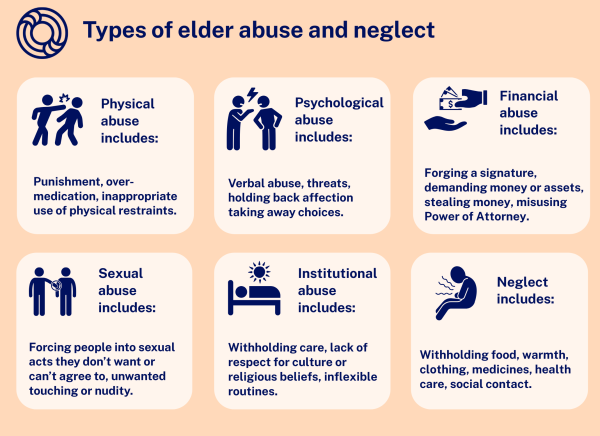
Image credit: Healthify He Puna Waiora
It can be difficult to spot elder abuse. The older person may be ashamed or afraid to talk about it. Abusers are often someone they depend on or live with. They may not realise what’s happening.
It's important not to jump to conclusions – the older person’s whole situation needs to be considered. There may be other health or family reasons for the things you notice.
- changes in behaviour, sleeping or eating habits
- withdrawal and/or edginess
- crying, talking about feeling hopeless, sad or helpless
- unexplained injuries
- drowsiness (due to over-medication)
- fear of a particular person or avoiding looking at or talking to them
- pulling back from touch, trembling or having a rigid posture
- unusual withdrawals from bank accounts or unusual decisions about property or other assets
- unpaid bills and/or not enough money for necessities
- hesitating to talk openly and waiting for the caregiver to answer
- seeming to contradict themselves even though they're not confused.
If you’re worried about how an older person is being treated, think about whether you can talk with them privately. You could ask:
- How are things going at home/in residential care?
- How do you feel your caregiver is managing?
- Are you OK?
- Is someone hurting you?
- Talk to someone you trust – a friend or someone in your family/whānau.
- Talk to someone you see regularly – a doctor, nurse, member of your church or spiritual leader.
- Talk confidentially with a worker from an agency with experience in dealing sensitively with elder abuse, such as Age Concern.
- Visit Age Concern elder abuse services(external link) to find your nearest service. Or you can call the national elder abuse response service(external link) 24-hour free phone line on 0800 32 668 65 or text 5032 or email [email protected].
If you, or an older person, are in immediate danger call the Police on 111.
Older people have the right to make their own choices and decisions – even if you don’t agree with them. Where older people’s choices are being undermined or over-ridden by others, it's important to question whether their human rights are being supported.
To help prevent elder abuse, older people should be:
- loved and cherished
- spoken and listened to respectfully, upholding their mana
- included in social activities
- phoned or visited regularly
- supported to spend their money how they wish
- encouraged and supported to make their own decisions
- enabled to set their own pace.
Video: Hidden harm – psychological abuse of older people
Video: Elder abuse – the signs of financial abuse
Elder abuse and neglect(external link) Age Concern, NZ
Identifying elder abuse(external link) Office for Seniors Te Tari Kaumātua, NZ
Abuse of older people(external link) World Health Organization
Financial abuse(external link) New Zealand Government
Brochures
10 tips to be kind and stop elder abuse(external link) Age Concern, NZ, 2020
It’s your money, and your choice(external link) Age Concern, NZ, 2023
Do you have questions about the safety of an older person/kaumātua?(external link) Age Concern, NZ, 2018
References
- Family violence intervention guidelines – elder abuse and neglect(external link) Ministry of Health, NZ, 2007
- Identifying elder abuse(external link) Office for Seniors Te Tari Kaumātua, NZ
- Elder abuse and neglect(external link) Age Concern, NZ
- Elder Abuse and Neglect(external link) Auckland Community HealthPathways, NZ, 2018
See our page Elder abuse for healthcare providers.
Brochures
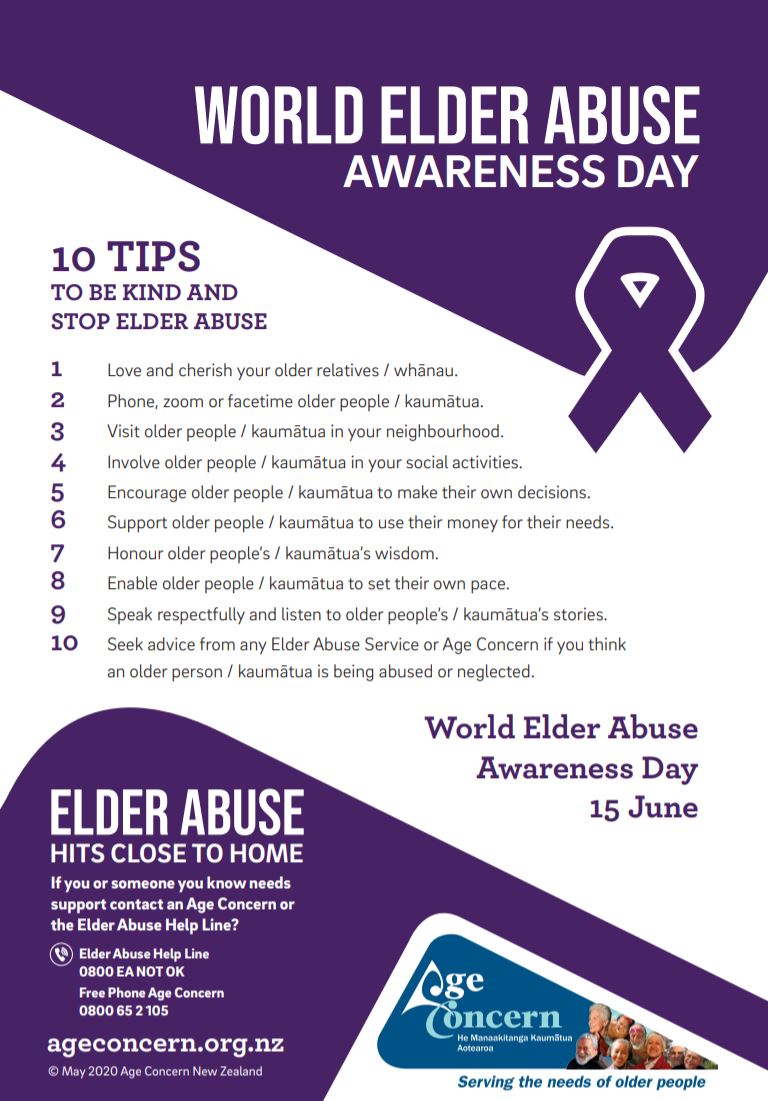
Age Concern, NZ, 2020
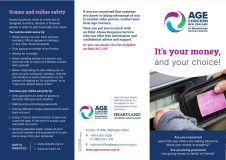
It’s your money, and your choice
Age Concern, NZ, 2023
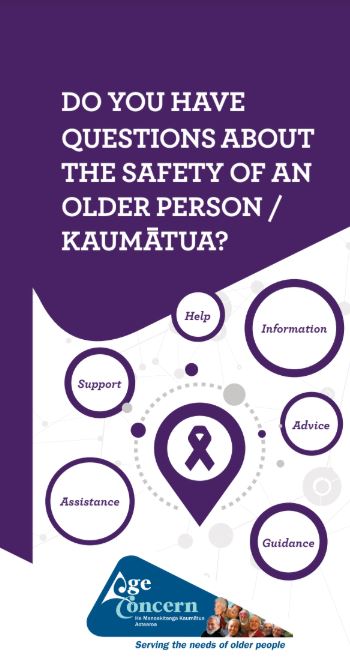
Age Concern, NZ, 2018
Credits: Healthify editorial team. Healthify is brought to you by Health Navigator Charitable Trust.
Reviewed by: Dr Emma Dunning, Clinical Editor and Advisor
Last reviewed:





